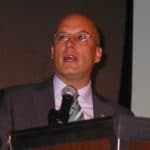- Elliott
NEW YORK – Former UTU Associate General Counsel Dan Elliott, now chairman of the U.S. Surface Transportation Board — the federal agency regulating rail mergers, line sales, abandonments and labor protection — returned to his roots July 4, speaking to more than 500 UTU officers and members attending the union’s eastern regional meeting here.
Terming train and engine workers “the unsung heroes” of the freight railroad industry’s renaissance, Elliott said, “None [of the resurgence] would have been possible without the people in this room. Labor was a major contributor to the rebirth of the rail industry as productivity shot through the roof [since Congress partially deregulated railroads through the Staggers Rail Act of 1980]. This is all thanks to your working harder, smarter and better,” he said.
Elliott recalled that prior to partial deregulation afforded by the Staggers Act, railroad bankruptcies were increasing, track often was in such poor repair that there were standing derailments, service quality had deteriorated and job security was problematic.
The Staggers Act, said Elliott, set loose market forces, giving railroads “greater flexibility to make decisions, develop better ideas and operate more efficiently. There are fewer trucks on the highway and the United States has some of the lowest freight rates in the world. It has all been done with private investment.” He said his job and the job of the STB is to “make sure the industry stays healthy.”
As for his elevation to the STB – which required a nomination by President Obama and confirmation by the Senate — Elliott said, joking, it was something he had long sought. Reflecting on an early-career appearance before the STB’s predecessor agency, the Interstate Commerce Commission, Elliott recalled having to make a difficult argument seeking labor protection.
“I was told to say my piece and sit down. So I went to Washington to the ICC Building. There were scores of railroad attorneys, a press table and spectators. I said my piece. And the chairman asked me to explain why UTU members should have lifetime income protection when nobody else in the room had it. I knew right then and there that I wanted to be the one asking the questions and not answering them,” Elliott said.
Related News
- Senate Strikes Down Spending Bill’s Harmful AI Provision
- Razor blade found on brake wheel
- Coming Soon: SMART-TD Voluntary Income & Life Protection (VILP) Program
- Senate Passes Tax Bill Without Including Railroaders
- SMART-TD Honors the Retirement of Brother Greg Hynes: A Visionary, a Fighter, and a Legend
- SMART-TD Calls on U.S. Senate to Support the Cantwell Amendment and Protect Rail Workers
- Yardmaster Protection Act Introduced
- PHOTO GALLERY: 2025 Denver Regional Training Seminar
- Fighting for Stronger Heat Protections for Rail Workers
- Regional Training Seminar Sets (Mile-High) Record in Denver
